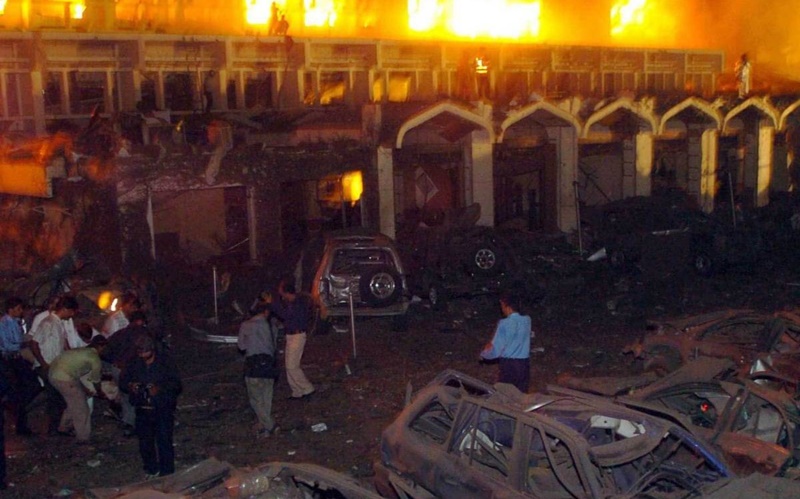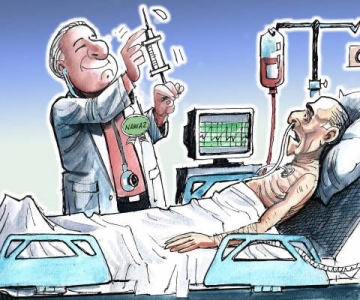 An overwhelming majority of Pakistan’s population finds itself hostage to narratives of ‘terror’ that are either alien to its ethos or are constructed by its home-grown theologians and opinion-makers. This is not to say that the issue of suicide bombings is easy to define and understand. They are essentially complex and located in decades of Pakistan’s evolution into a society that is difficult yet again to label: Islamic in name, struggling to be democratic and a republic it is not, well, not yet.
An overwhelming majority of Pakistan’s population finds itself hostage to narratives of ‘terror’ that are either alien to its ethos or are constructed by its home-grown theologians and opinion-makers. This is not to say that the issue of suicide bombings is easy to define and understand. They are essentially complex and located in decades of Pakistan’s evolution into a society that is difficult yet again to label: Islamic in name, struggling to be democratic and a republic it is not, well, not yet.
If we take the viewpoint of liberals, it is our war as much as a war of others. If we were to hear the west, it is about countering terror and preserving world peace; and if we listen to Pakistan’s right it is someone else’s battle fought on our land — the land of the pure lest we forget.
Where does this leave the confused, battered citizen who now has to strive for personal security among other daily struggles of existence? There are no clear answers and if one were to probe further, the questions are as murky as their geneses.
One thing is clear though: to identify the recurrent suicide bombings in the name of theological, tribal and imperial grievances is at best a half-truth. The genie is far more complex than a response to the reductionist narrative of “war against terror” and such other imperial phraseology. At the core of this phenomena, if one were to be rather blunt, lies an exclusive, bigoted ‘ideology’ of a few men of holy intentions orchestrating a script written by others.
The Deoband School has in no uncertain terms rejected the “Islamic” pretensions of acts against the civilians; and especially the ones of suicidal variety. Haram is forbidden and that’s that. The Pakistani madressahs, drawing their inspiration from the Deobandi view of the world, need to hear this clearly. The Holy Book, traditions of the Prophet (pbuh) and later jurisprudence down to the Al-Azhar debates today allow no room for the pusillanimity of the invisible men (or women) buying their way to heaven through self-immolation.
What is happening then? Among the various postulates, the economic argument is the strongest. Pakistan’s tribal areas, bypassed by modernity and economic progress are the poorest areas of the country. Other than lack, or shall we say virtual non-existence, of infrastructure and employment opportunities, the ordinary citizens (for the sake of argument only) live in a society bound by the tribal code and an administrative system reminiscent of medievalism. Human life and dignity are subsumed in tribal honour. And political Islam exploits all these fault lines to its maximum advantage.
In these rural ghettos, it is not difficult to sell the temporal and the spiritual package to families who are aggrieved by the ongoing war in their courtyards often sneaking into their schools, madressahs, marriage processions and day-to-day life.
This leads to the question of financing the militancy. Quite obviously, the figure of one million per family, anecdotal as it is, requires extensive cash transfers and an efficient system of exchange that either escapes scrutiny or is embedded. Either of the scenarios is worrying and merits a dispassionate analysis and not an emotional call for ending the “foreign” war.
Who are these clerics and networks that motivate young minds to accept death? What sort of indoctrination takes place where? The situation is mystified by anecdotes on all sides again depending which line you take and who is your source. The western media would make us believe that it is the simplistic jihad for Bin Laden-ism; the NWFP versions suggest a resurgent Pakhtun nationalism; and the mainstream right talks of the larger role of the west in the Islamic world. Utter state of confusion and uncertainty most conducive to such anti-people moments of history.
The tally is scary. During 2007, over 1,500 Pakistanis were killed and thousands injured and maimed. In the first quarter of 2008, nearly 400 have died in acts of terrorism most notably suicide bombings. In 2006 the suicide attacks were six in number. A year later, over 60 attacks took place and the graph continues to rise. Thanks to a liberated media, you can see real time heads, limbs, security guards being rammed into and all the gore that would put surrealism to shame.
And what does it say about the claims of our Islamic identity? That no mosque, Imambargah or even a funeral prayer is safe. Busy markets could turn into graveyards and peaceful rallies are venues for mass murders!
The discourse surrounding these acts is even more worrying. TV channels show speakers arguing for Shariat imposition in the north western areas to avoid such attacks; and respectable politicians, columnists and experts are found stressing that this is all a ‘reaction’ to our faulty policies. As if these were changed or reversed the jihad factories would change the production line? Perhaps for a short while but then where would the holy warriors go?
Not long ago, these warriors were fighting by the side of today’s villains. In the words of Samir Amin, “Political Islam is not anti-imperialist, even if its militants think otherwise! It is an invaluable ally for imperialism and the latter knows it”. This is why a range of opinion polls show that a vast majority of people are against suicide bombings. Overtime the people have smelt the rot masked as bravery.
The truth is that any ‘justification’, even if remotely rational, amounts to legitimising the heinous anti-people acts. What is the fault of ordinary citizens on the street to be targeted in such a brutal manner? No excuse or explanation will work as all such narratives lead to making barbarity the norm. Chopped heads in Swat, the blood of Benazir Bhutto and what not. How could an anti-imperial struggle end up imitating the imperial tact of wreaking and then accepting collateral damage?
The sooner that we realise this, the better it is. What needs to be condemned has to be condemned. Extremism is spreading within the body politic and it needs to be countered through all means, from dialogue, development and if needed force. The root cause is poverty and lack of opportunity leading to alienation that is easily exploitable. This alienation is not tribal or religious but economic and class-oriented; and did not spring from nowhere after NATO-occupied Afghanistan.
About time we faced these prickly little truths before blaming the world and the gods.
Published earlier in The News



